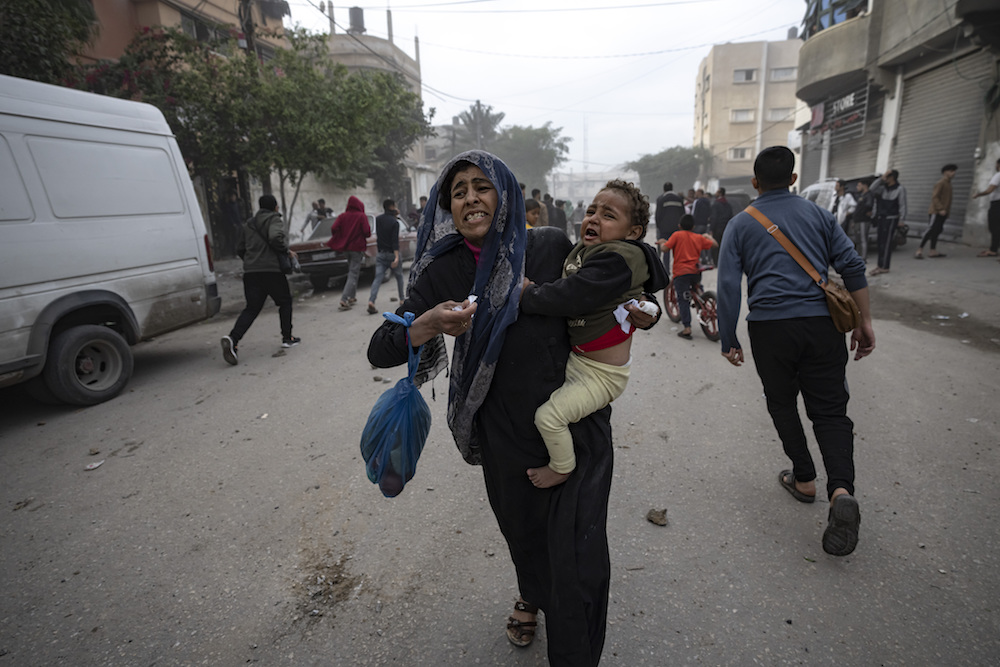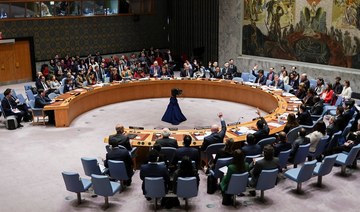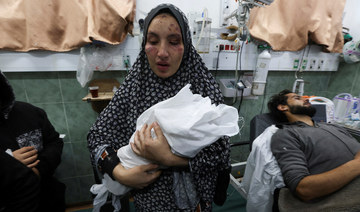LONDON: The Israeli military faces fresh accusations that it continues to disregard the rules of engagement during the war in Gaza, after its troops shot and killed three Israeli hostages last week.
Critics said the mistake was an inevitable result of the excessive reliance on violence by the Israel Defense Forces, or perhaps indiscipline.
That the three men were killed by would-be rescuers from their own side is tragedy enough. But the fact that the Israeli troops decided it was acceptable to open fire on unarmed individuals, who had their hands raised and were waving a white flag of surrender, shines a light on the brutal course of the war.
When they were killed in Gaza’s Shejaiya neighborhood on Dec. 15, the three men —Alon Shamriz, Samer Al-Talalka and Yotam Haim — were screaming for help in Hebrew and waving a white sheet daubed with the letters “SOS” as they approached soldiers.
The IDF was swift to denounce the killings as a breach of its own rules of engagement and said the three men had been “mistakenly identified … as a threat.” Israeli Prime Minister Benjamin Netanyahu expressed his “deep sorrow” over their deaths.

However, Avi Shamriz, the father of one of the men who was killed, told NBC News the shootings indicated that the war was being fought without due regard for the safety and well-being of the hostages.
About 250 people were taken captive when Hamas militants attacked southern Israel on Oct. 7, killing 1,139 people, mostly civilians, according to updated Israeli figures.
More than 100 Israeli and foreign hostages were released in exchange for 240 Palestinian prisoners during a week-long truce last month, mediated by Qatar and Egypt.
As protests took place in Tel Aviv about the government’s handling of the hostage crisis, Herzi Halevi, chief of the general staff of Israel, clarified the rules of engagement in cases of surrender.
“You see two people, they have their hands up and no shirts, take two seconds,” Halevi told soldiers in reference to the shooting incident, during which all three of the men had removed their shirts to make it clear they were not wearing suicide vests.
“What if it is two Gazans with a white flag? Do we shoot? Absolutely not. Even those who fought but now put down their weapons and raise their hands, we capture, we don’t shoot.”

People join family members of hostages held by Hamas as they gather to protest outside the home of UN Secretary General António Guterres on December 15, 2023 in New York City. (AFP)
Despite the assurances, critics suggest the incident in which the hostages were killed is in keeping with the IDF’s controversial track record in the use of force and the prioritization of the security of Israelis in Gaza and other occupied Palestinian territories.
Citing data from the UN Office for the Coordination of Humanitarian Affairs, sources told Arab News that such behavior by Israeli military forces had resulted in the deaths of more than 5,300 Palestinians, largely caused by bombs and bullets, between 2008 and a month prior to the start of the current conflict.
Muhannad Ayyash, a professor of sociology at Mount Royal University in Calgary, Canada, said it was well-known that the Israeli military played fast and loose with the rules of engagement prior to the Oct. 7 Hamas attack.
Based on accounts given by Israeli officers, Ayyash said those rules have been loosened further still since the current conflict began, so as to “allow soldiers to make fewer checks before shooting at suspected enemies,” including in instances of apparent surrender.
“I trust the reports of these officers, based on the facts we have observed since then,” Ayyash told Arab News.
“For example, snipers are shooting civilians, including in hospitals, and there has been at least one reported mass execution of women, children and babies who were sheltering inside a school, as well as so many other examples.”

This handout picture released by the Israeli army on December 17, 2023 reportedly shows a makeshift sign reading in Hebrew “Help, 3 hostages” using leftover food remains by by the three Israeli hostages who were mistakenly killed by Israeli forces, found after searches in a building adjacent to where the incident took place. (AFP/Handout / Israeli Army
Ayyash and others have drawn a direct link between the accidental killing of Israeli hostages by the IDF and the apparent willingness of personnel to shoot Palestinians who pose no threat.
Such incidents include the shootings of Eyad Hallaq, a 32-year-old man with autism, in May 2020 and journalist Shireen Abu Akleh in May 2022.
Israeli human rights monitor B’Tselem also accuses Israeli troops of “illegally executing” two Palestinians, one of whom was incapacitated and the other unarmed, during a raid in the West Bank.
Roy Yellin, B’Tselem’s director of public outreach, told Time magazine that the killing of the three Israeli hostages on Dec. 15 was “heart-breaking but not surprising.”
Over the years, he said, his organization has documented “countless incidents of people who clearly surrendered and who were still shot,” in contravention of all rules of war, and with little in the way of punishment of those responsible to act as a deterrent and help prevent future incidents.
However, Kobi Michael, a senior researcher at the Institute for National Security Studies, an independent think tank affiliated with Tel Aviv University, and the Misgav Institute for National Security, rejected claims that such incidents are part of standard operating procedure of the IDF.

Palestinians transport a captured Israeli civilian from Kibbutz Kfar Azza, near the Gaza border, to the Gaza Strip on October 7, 2023. (AP)
“What happened in Shejaiya on Friday is an exception to the rule, a very sore exception, and I think everyone understands it was a mistake, a breach of regulations,” he told Arab News.
“But it is not indicative of the IDF’s widespread disregard. We have to understand it in the context. We are talking about an incident in a place where 10 Israeli soldiers and a senior commander were killed.
“This is an area full of Hamas fighters that are trying their utmost to confuse the IDF soldiers by deception. The soldiers have less than a second to make the call on whether to shoot or not to shoot. This is something that does not represent the Israeli rules of engagement.”
Michael added that the Israeli military “conforms to the law of war” and is making efforts to minimize civilian casualties, even at the expense of its own troops.
Hassan Ben Imran, a member of the board at UK-based human rights organization Law For Palestine, is unconvinced by this assessment.

Palestinians evacuate from a site hit by an Israeli bombardment on Rafah, southern Gaza Strip, Wednesday, Dec. 20, 2023. (AP)
“Such responses are like those you find within a guidebook that they all read from” rather than reflective of the reality on the ground, Imran told Arab News.
Testimonies by former IDF soldiers, documented by the Israeli veterans group Breaking the Silence, also suggest that incidents in which the rules of engagement were disregarded are more common and widespread than the Israeli government or its military would care to admit.
Avner Gvaryahu, who heads the group, told Time magazine he was “skeptical” of the IDF statement that the three Israeli hostages were killed in “violation of the rules of engagement.”
He said accounts from soldiers who served during previous military campaigns in the Gaza Strip indicated that once the IDF deems an area to have been “cleared of civilians,” soldiers are instructed to “shoot everything that moves.”
The IDF had sought to clear civilians from the area in which Shamriz, Al-Talalka and Haim were killed, declaring it an active combat zone. It remains unclear why the three men were there at all, one theory being they had managed to escape their captors.

This handout picture released by the Israeli army on December 21, 2023 shows soldiers operating in the Gaza Strip, amid continuing battles between Israel and the Palestinian militant group Hamas. (AFP/Handout/Israeli Army)
“Anyone who thinks it is easy for soldiers to make split-second decisions in the chaos of urban combat is naive,” Geoffrey Corn, chair of criminal law and director of Texas Tech University’s Center for Military Law and Policy, told Arab News.
“The reality is mistakes happen in war all the time and, sadly, sometimes deliberate violation of rules also happen.
“Where this (incident) falls along this continuum is impossible to know at this point but no matter, it was a tragedy. If a mistake, it’s important to acknowledge Hamas’ pervasive disregard of the rules of war almost certainly influenced the soldiers’ reaction to what they saw and heard.
“This is why treachery and violating the rules of war in order to gain an advantage by exploiting compliance with the rules is itself a violation of international humanitarian law.”
Speaking at an event on Tuesday, US President Joe Biden said he recognizes that the IDF is facing an enemy with one goal: “The elimination, through the use of terror, of the entire state of Israel.”
But despite what he described as these “added burdens,” he said Israeli forces must differentiate between members of Hamas and Palestinian civilians, and urged them to minimize non-combatant deaths.





























